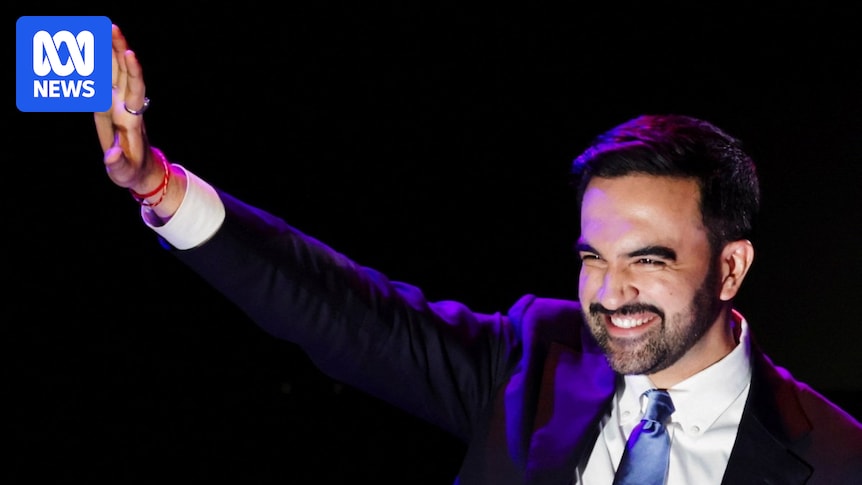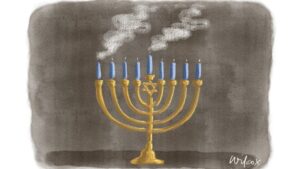
When the results flashed across television screens at a jubilant gathering in Queens, New York, confirming Zohran Mamdani as the city’s new mayor, the room erupted in celebration. Caitlin McNaughton, a local resident, leapt to her feet, overcome with emotion as the crowd chanted, “Mam-da-ni! Mam-da-ni!”
“Things have just been so bleak,” McNaughton exclaimed, capturing the sentiment of many New Yorkers who had gathered at the beer garden in Mamdani’s own neighborhood. The 34-year-old Democratic socialist had just made history by winning New York City’s mayoral election with a commanding lead, a victory that resonated far beyond the city limits.
A Platform of Change
Mamdani’s campaign, characterized by a far-left policy platform that included proposals such as taxing the rich and establishing city-run grocery stores, faced skepticism and ridicule from various quarters, including from former President Donald Trump. Yet, Mamdani’s triumph on election night suggests a significant shift in the political landscape, driven in large part by women like McNaughton.
“I’m extremely proud to be a New Yorker but lately I’ve been embarrassed to be an American,” McNaughton said, referencing the Trump administration’s controversial policies. “This is a glimmer of hope.”
Mamdani, representing the Democratic Party, managed to energize a previously disengaged voter base across the city. His victory is seen by some as a potential catalyst for the Democratic Party, which has struggled with internal divisions and a lack of direction since Trump’s presidential win.
Galvanizing a Diverse Electorate
While some analysts argue that Mamdani’s policies may not gain widespread traction nationally, his focus on the high cost of living in New York City resonates with many Americans. His ability to galvanize young voters, particularly women, played a crucial role in his success.
According to an exit poll conducted by CNN, Mamdani secured about two-thirds of voters under 45, including 84 percent of women aged 18 to 29 and 65 percent of women aged 30 to 45.
Women, who constitute a larger share of the American electorate and historically vote in higher numbers, were pivotal to Mamdani’s victory.
A Historic Milestone
Mamdani’s election marks a historic milestone as he becomes New York City’s first Muslim mayor. Born in Uganda, Mamdani migrated to the United States as a child. His victory, with 50.4 percent of the vote, outpaced independent candidate Andrew Cuomo, who garnered just over 41 percent.
Cuomo, a former governor of New York who resigned amid sexual harassment allegations, ran as an independent after losing the Democratic primary to Mamdani. The Republican candidate, Curtis Sliwa, trailed significantly behind.
For many, Mamdani’s win is deeply personal. Shanaz Chowdhury, a 38-year-old mother and first-generation Bangladeshi immigrant, celebrated the victory with her family and friends. “As someone who has experienced Islamophobia since 9/11, this is monumental,” she said. “I’m proud my son won’t have to go through what I have.”
Challenges and Opportunities
Despite the widespread support, Mamdani’s victory did not transcend all demographics. New York City is home to the largest Jewish community outside Israel, and the majority of this group supported Cuomo, according to CNN’s poll. Mamdani’s pro-Palestinian activism and criticism of Israel’s government have been points of contention.
Nonetheless, Mamdani’s support among other communities was strong. He received backing from 54 percent of black women and 51 percent of Latina women. Even among white women, Mamdani secured 47 percent of the vote, compared to Cuomo’s 45 percent.
“The conventional wisdom would tell you that I am far from the perfect candidate,” Mamdani remarked in his victory speech. “I am young, despite my best efforts to grow older. I am Muslim. I am a Democratic socialist. And most damning of all, I refuse to apologize for any of this.”
Grassroots Support and Future Prospects
Kristina Teschner, a 44-year-old Brooklyn resident, was among those who volunteered for Mamdani’s campaign. Having faced financial difficulties and health challenges, Teschner found hope in Mamdani’s candidacy. “Just knowing this campaign existed makes me feel more taken care of,” she said. “The heartbeat of New York isn’t in corporate boardrooms. It’s the taxi drivers, the bodega owners, the nurses, the teachers — people like me.”
Mamdani’s victory signals a potential shift in New York City’s political landscape, with implications for the broader Democratic Party. As he prepares to take office on January 1, the city and the nation will be watching closely to see how his administration tackles the challenges ahead.






